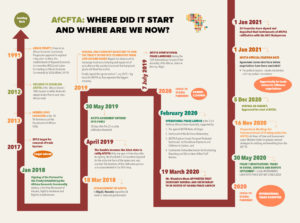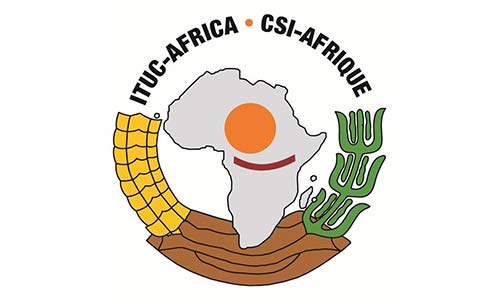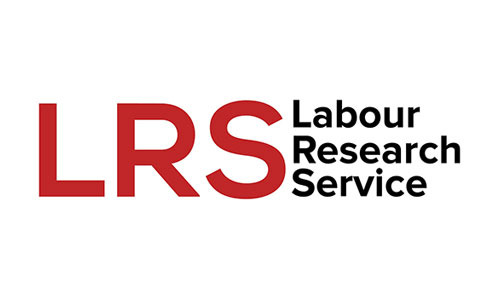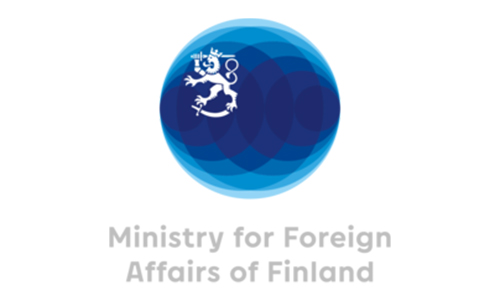The African Continental Free Trade Area (AfCFTA) is being established by the 55 member states of the African Union. The AfCFTA agreement aims to create a single market for goods and services and promote the movement of capital and people.
Looking back
The AfCFTA was put forward at the 18th Session of the African Union (AU) in Ethiopia in 2012. Six years later, on 21 March 2018 in Rwanda, 44 heads of states formally signed the Agreement on the Establishment of the African Continental Free Trade. More countries have since signed the agreement.
According to Article 23 of the Agreement, the AfCFTA could come into effect 30 days after 22 countries ratified it. The agreement subsequently came into effect on 30 May 2019.
In all of the AU’s history, this is one of the most impressive feats. It took a record one year and ten days to reach the threshold of ratifications needed to launch the AfCFTA. Nigeria, Africa’s biggest economy, delayed signing the agreement. The country was concerned about dumping and how it’d impact its fledgling manufacturing and farming sectors. With Nigeria finally signed up, the operational phase of the AfCFTA was officially launched during the 12th Extraordinary Session of the Assembly of the AU in Niger on 7 July 2019.

CASE STUDY: NIGERIA – the only country to raise concerns about the AfCFTA“Nigerian consumers and traders, and various of the country’s industries, including financial and telecommunications services industries, potentially stand to benefit from the AfCFTA and are therefore broadly supportive of Nigeria’s participation in the AfCFTA. However, these stakeholders are less well organised and less politically influential than the country’s manufacturing industries, which are more sceptical about the AfCFTA. Having long benefited from the significant protections afforded by Nigeria’s highly restrictive trade regime, the manufacturing sector initially lobbied against the AfCFTA and have urged the government to ensure that Nigeria’s large domestic market doesn’t become a ‘dumping ground’ for foreign products, thereby harming local manufacturing firms who already have to contend with a highly unfavourable business environment.” (Woolfrey, Apiko & Pharatlhatlhe, 2019).
“The importance of centering democratic norms in the implementation of the AfCFTA cannot be under-emphasised. As shown in the Nigerian case, a lack of consultation with broader civil society can prove to be an obstacle. Despite Nigeria’s active involvement in the negotiations and drafting of the AfCFTA Agreement, the government made a last-minute decision not to sign the Agreement as a result of pressure from stakeholders such as the Nigerian Labour Congress and the Manufacturing Association of Nigeria. Abuja later released a statement citing the need to engage in more domestic sensitisation and consultation before signing the Agreement. Had such process preceded the plan to sign the Agreement, the Nigerian government would not have been entangled in an avoidable embarrassing diplomatic situation.
Another factor that points to the imperative of democratic norms in the AfCFTA operational matrix is that the independence and quality of national institutions such as the judiciary, parliamentary and technocratic agencies are central to ensuring that citizens meaningfully benefit from the AfCFTA arrangement. In the same vein, the choices regarding tariff and non-tariff barriers are bound to affect citizens in multi-dimensional ways, and as such accord them the right to engage.” (B. Fagbayibo, 2019)
The arrival of the Covid-19 pandemic in 2019 severely disrupted society and global trade. The AfCFTA is one of the many processes globally that got derailed by the pandemic. We still don’t know the long-term effects of Covid-19. What’s clear is the severe impact of the disrupted global supply chains on African countries. The question we must ask is, how will the pandemic impact the AfCFTA’s prospects for renewing economic growth and development?
The AfCFTA is one of the rare trade agreements that came into force before negotiations were completed. The official starting date for the agreement was on 1 January 2021 and Phase I of the negotiations commenced in 2020. While commending the political will displayed by African leaders, we must also consider the risks of having a Free Trade Area agreement being in force legally but not operationally.

Click here to enlarge the image
You might also like:
Marie Daniel
Marie Daniel is an Associate at Labour Research Service. Marie has an urban studies and development economics background and one of her research passions is organisation and participation approaches within the informal sector. She is intrigued by the manner in which participatory democracy is approached and implemented in South Africa.




